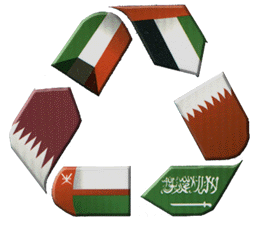|

GULF
COOPERATION
COUNCIL
ESTABLISHMENT
AND
FUNCTIONS
The
text
of
the
Charter
for
the
Gulf
Cooperation
Council
was
agreed
upon
at
a
meeting
of
the
Foreign
Ministers
of
Bahrain,
Kuwait,
Oman,
Qatar,
Saudi
Arabia,
and
the
United
Arab
Emirates,
on
February
4,
1981
in
Riyadh,
Saudi
Arabia.
The
Charter
was
signed
by
the
Heads
of
State
of
these
countries
on
May
25,
1981,
in
Abu
Dhabi,
at
which
time
the
Gulf
Cooperation
Council
formally
came
into
being.
The
objectives
of
the
Gulf
Cooperation
Council,
as
stated
in
the
Charter,
are
to
effect
coordination,
integration
and
interconnection
between
Member
States
in
all
fields
in
order
to
achieve
unity
between
them;
to
deepen
and
strengthen
relations,
links
and
scopes
of
cooperation
prevailing
between
their
peoples
in
various
fields;
to
formulate
similar
regulations
in
various
fields
including,
inter
alias,
economic
and
financial
affairs,
agriculture,
industry,
commerce,
customs
and
communications,
education
and
culture,
social
and
health
affairs,
information
and
tourism,
and
legislative
and
administrative
affairs;
to
stimulate
scientific
and
technological
progress
in
various
fields,
to
establish
scientific
research
centers
and
implement
common
projects,
and
to
encourage
cooperation
by
the
private
sector.
COMPOSITION
6
member
countries:
Kuwait
-
United
Arab
Emirates
-
Bahrain
-
Kingdom
of
Saudi
Arabia
-
Oman
-
Qatar.
STRUCTURE
The
Supreme
Council
is
the
Gulf
Cooperation
Council's
highest
authority
and
is
composed
of
the
heads
of
Member
States.
Its
presidency
is
rotated
annually
on
the
basis
of
the
alphabetical
order
of
names
of
Member
States.
The
Supreme
Council
provides
policy
direction,
reviews
reports
and
recommendations
submitted
by
subsidiary
bodies,
appoints
the
Secretary-General
and
approves
the
budget
of
the
Secretariat-
General,
and
approves
the
rules
of
procedure
of
the
Commission
for
Settlement
of
Disputes
and
nominates
its
members.
Resolutions
are
passed
on
the
basis
of
unanimity
for
substantive
matters
and
majority
for
procedural
matters.
The
Supreme
Council
meets
annually,
and
in
Extraordinary
session
if
requested
by
any
member
and
seconded
by
another
member.
The
Advisory
Commission
for
the
Supreme
Council
is
a
30-member
body
with
seats
equally
distributed
among
the
six
member
countries
composing
the
GCC.
Established
in
1998,
it
provides
advice
on
any
subjects
referred
to
it
by
the
Supreme
Council.
The
Commission
for
Settlement
of
Disputes
is
formed
separately
for
every
case,
based
on
the
nature
of
the
dispute.
The
Commission
submits
its
recommendations
to
the
Supreme
Council
for
consideration.
The
Ministerial
Council
is
composed
of
Foreign
Ministers
or
such
other
ministers
as
Member
States
may
delegate.
Its
Chairman
is
rotated
every
year.
The
state
that
hosts
the
summit
assumes
the
chairmanship
for
the
year.
The
Ministerial
Council
proposes
policies
and
prepares
recommendations,
studies,
and
projects
aimed
at
developing
cooperation
between
Member
States
and
endeavors
to
encourage,
develop
and
coordinate
activities
existing
between
Member
States
in
all
fields.
Resolutions
are
passed
on
the
basis
of
unanimity
for
substantive
matters
and
majority
for
procedural
matters.
The
Ministerial
Council
meets
every
three
months,
and
in
Extraordinary
session
if
requested
by
any
member
and
seconded
by
another
member.
The
Secretariat-General
is
headed
by
the
Secretary-General,
who
is
appointed
by
the
Supreme
Council
for
a
three-year
term,
renewable
only
once.
The
Secretary-General
nominates
the
Assistant
Secretaries-General,
who
are
appointed
by
the
Ministerial
Council
to
renewable
three-year
terms.
The
Secretariat-General
is
composed
of
the
Office
of
the
Secretary-General,
Directorates
of
Political
Affairs,
Economic
Affairs,
Military
Affairs,
Environmental
and
Human
Resources,
Legal
Affairs,
Financial
and
Administrative
Affairs,
and
an
Information
Center.
There
is
also
the
GCC
Permanent
Mission
to
the
European
Commission
in
Brussels
headed
by
an
Ambassador.
|